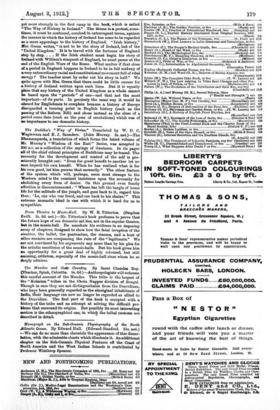The Buddha's "Way of Virtue." Translated by W. D. C.
Wagiswara and K. J. Saunders. (John Murray. 22. net.)—The Dhammaparda, a translation of which forms the latest volume of Mr. Murray's " Wisdom of the East " Series, was accepted in 240 B.C. as a collection of the sayings of Gautama. In its pages all of the chief ethical principles of Buddhism may be traced. The necessity for the development and control of the self is pro- minently brought out: "Even for great benefit to another let no man imperil his own benefit. When he has realized what is for his own good, let him pursue that earnestly." The other feature of the system which will, perhaps, seem most strange to the Western mind is the constant insistence upon the necessity for abolishing every form of desire. On this ground even family affection is discountenanced : " Whose has left the tangle of home life for the solitude of the jungle, and goes back to it, regard him thus : 'Lc), one who was freed, and ran back to his chains.'" This extreme monastic ideal is one with which it is hard for us to sympathize.




































 Previous page
Previous page